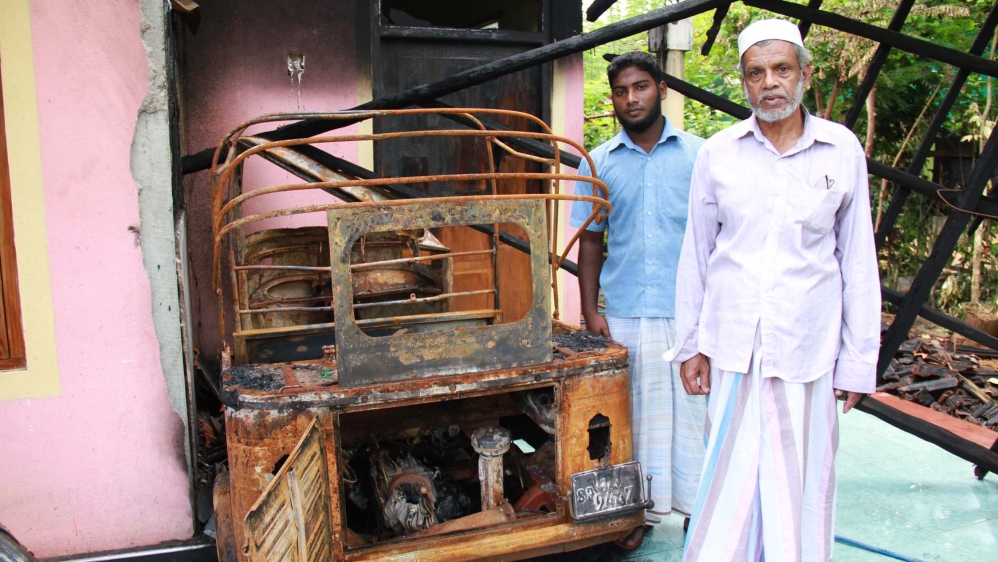Image: Rows of burned houses and businesses bear testimony to the violence [M Riza/Al Jazeera]
by M Riza
Ginthota, Sri Lanka – Muhammad Abrar is still in shock, nearly a week after his house in Ampitiya village in the southern Sri Lankan town of Ginthota came under attack from a Sinhalese-Buddhist mob.
On November 17, he had returned from the mosque after evening prayers and was about to retire for the night, when he heard his neighbours’ home being attacked.
“The first attack on our home was when our window panes were broken by rocks,” said Abrar, who drives a tuk-tuk (three-wheeled taxi) for a living.
“There was a mob of about 150 to 200 people armed with steel crowbars and other makeshift weapons. They smashed our gate and came in and poured petrol on my tuk-tuk and set it on fire.”
The burned tuk-tuk is still parked in front of his house, with little hope of being salvaged. What was once the painted pink facade of his house is now black with soot. The tiled roof of Abrar’s house collapsed as flames engulfed the wooden rafters.
Fear and shock have gripped the Muslim community in Ginthota – about seven kilometres from the tourist city of Galle – and rows of burned houses and businesses bear testimony to the violence.
Police and Special Task Force (STF) personnel were deployed after the violence, which spread across many administrative divisions in Ginthota.
Residents say a scuffle over a minor road accident escalated into mob attacks between Buddhist and Muslim youths. It later developed into full-blown, targeted anti-Muslim violence, with dozens of houses and at least two mosques damaged in arson attacks.
Growing Buddhist-Muslim tensions
Tensions have been growing between the two communities this year, with Buddhist nationalists attacking a United Nations safe house for Muslim-majority Rohingya in September, while a number of Muslim homes and businesses were attacked in June.
Mohammed Faizal, the secretary of the Ginthota Young Muslims Association, who was himself a victim, says that fresh tensions started building after an accident involving a Muslim woman and a Buddhist on November 13. Police intervention prevented immediate escalation.
“November 17 was calm and as usual we went for Friday prayers and returned. There was a heavy police and STF presence,” Faizal said.
 |
| ‘They smashed our gate and came in and poured petrol on my tuk-tuk and set it on fire,’ said Muhammad Abrar, pictured with his son[M Riza/Al Jazeera] |
The violence erupted that night, after Faizal says a lack of security measures allowed the situation to spiral out of control.
Manusha Nanayakkara, the member of parliament for the Galle district, agreed that the “withdrawal of the STF was a grave mistake that facilitated all these violent groups”.
“This incident did not begin due to a Sinhalese-Muslim issue. Both parties are to blame for letting this matter escalate from a minor road accident,” Nanayakkara said. “Peace committees should be activated with representations from the village mosques and temples to prevent any such attacks taking place again.”
Fear and trauma
In the wake of the violence, police have arrested 22 people. Police spokesperson Ruwan Gunasekera confirmed that 127 cases of attacks had been reported to police.
The violence has brought back memories of the 2014 Aluthgama attacks, during which three people were killed.
Muhammad Yasir told Al Jazeera that he was at home with his wife and two daughters when a mob of about 50 youth started attacking homes in the narrow lane where his house is located.
“My motorcycle was dragged to the street and completely torched. Three minutes after the first attack, another group of five youth destroyed our front door and entered our home,” Yasir said. “They broke open cupboards and looted the jewellery inside.”
I do not choose between Sinhalese and Muslim.
– MUHAMMAD FAHIM, LOCAL RESIDENT
Businesspeople in the area explained how their shops and lifelong savings were destroyed.
Muslims in Ginthota and across parts of the island nation, where they form 10 percent of the population, have been living in fear and trauma, with many women and children refusing to return to their homes.
Galogodaththe Gnanasara – the hard-line monk from the Bodu Bala Sena, known for his incendiary remarks, particularly those that fuelled the anti-Muslim attacks in Aluthgama – told a press conference that there were approximately 500 youth who had assembled at the temple, presumably in response to the hysteria spread through social media. Addressing a media conference on November 21, Gnanasara, who has ties to Ashin Wirathu of Myanmar, was reported by one local newspaper as having “boasted that he can orchestrate a bloodbath in under two hours”.
Police say social media rumours about Muslims planning to attack a Buddhist temple triggered the violence.
 |
| Muslims in Ginthota and across parts of the island nation have been living in fear and trauma [M Riza/Al Jazeera] |
Many local residents told Al Jazeera that the mob included people from inside the village. But one Sinhalese resident, a construction professional living in Ampitiya, denied involvement of village insiders. Sunil Gamage, who spoke under a pseudonym, noted that his home also came under attack.
“The residents in this area [Muslim and Sinhalese] live in peace, and there is no problem between us,” he told Al Jazeera.
Police and STF personnel have been patrolling the streets, along which most houses have had their gates smashed down and the glass window panes destroyed.
Muhammad Fahim, a young father of four boys, earns his livelihood by manufacturing and selling cement blocks for construction. The pick-up truck he used to transport his blocks was set ablaze.
A tearful Fahim explained how his home manufacturing plant was damaged and 800 of his cement blocks, which were ready for sale, broken to pieces.
Fahim cannot fathom how this could have happened to him: “I do not choose between Sinhalese and Muslim,” he said.
– Al Jazeera